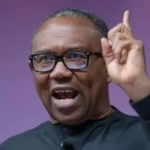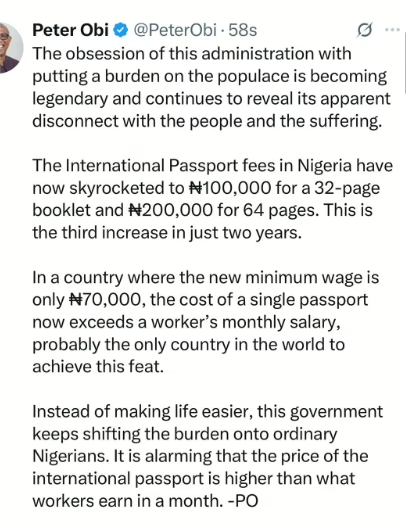Peter Obi Condemns Federal Government’s Escalation of Passport Fees
In a recent social media address, Peter Obi sharply criticized the Nigerian government for its decision to raise passport issuance fees, describing the move as an undue hardship on everyday citizens.
New Passport Pricing Structure Announced
On August 28, the Nigeria Immigration Service declared a significant increase in the cost of Nigerian passports. The fee for a 32-page passport booklet has surged to ₦100,000, while the 64-page version now costs ₦200,000.
Obi Highlights the Growing Financial Strain on Nigerians
Obi emphasized that rather than alleviating citizens’ challenges, the current administration continues to impose heavier financial burdens. He pointed out that this pattern of increasing costs reflects a troubling disconnect between the government and the realities faced by ordinary Nigerians.
“The relentless drive by this administration to impose financial burdens on the populace has become a defining characteristic, exposing a stark disconnect from the struggles of the people,” Obi stated.
“The passport fees have now escalated to ₦100,000 for a 32-page booklet and ₦200,000 for a 64-page booklet-marking the third hike within just two years.”
“Considering that the current minimum wage stands at ₦70,000, the cost of obtaining a passport now surpasses what many workers earn in an entire month. This unfortunate reality may be unique globally.”
“Instead of simplifying access to essential services, the government continues to transfer the financial strain onto ordinary Nigerians. It is deeply concerning that the price of an international passport exceeds the monthly income of many workers.”
Contextualizing the Impact
This increase comes amid ongoing economic challenges in Nigeria, where inflation and cost of living continue to rise. For many Nigerians, passport acquisition is essential for travel, work, and education abroad, making the fee hike a significant barrier.
To put this into perspective, in neighboring Ghana, passport fees average around ₦50,000 (approximately GHS 250), highlighting the disproportionate cost burden Nigerian citizens now face.
Calls for Government Accountability and Relief Measures
Obi’s critique underscores a broader demand for government policies that prioritize citizens’ welfare, especially in times of economic hardship. Advocates urge the government to reconsider such fee increases and explore alternative revenue sources that do not disproportionately affect vulnerable populations.


















0 Comments